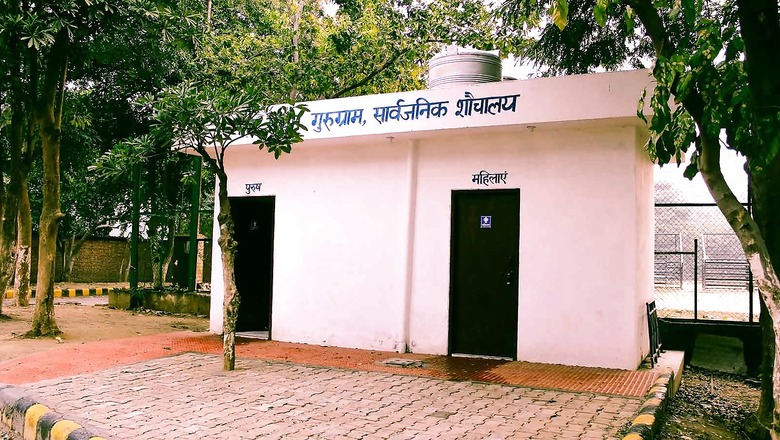
views
India is on a path of transformation. The country is looking to solve pertinent issues such as open defecation, general hygiene, and water conservation that have plagued the country for decades. We have already achieved remarkable progress under the Swachh Bharat Mission (Grameen) by providing access to toilets for all in rural India. In all, nearly 11 crore household toilets were built in rural India as part of the ambitious campaign, and the initiative has emphasised participation from individual to community levels at every stage.
India has come a long way in ensuring safe sanitation practices in every pocket of the country. Following the unprecedented success in access to sanitation, the challenge is to sustain the progress achieved so far. Changes in behaviour and mindset can ensure sustainable sanitation for all in India.
There is a need to continue creating awareness among the public to prioritise proper sanitation and hygiene practices. Myths and misconceptions around sanitation practices still present in our society often adversely impact marginalised sections, mostly women, children, and transgender people.
In order to achieve the larger goal of water conservation and safe sanitation for all, it is essential that awareness be generated among people so they come together at the community level to develop innovative and affordable solutions. According to a paper published by the Sustainable Sanitation Alliance, professional marketing of sanitation to those without access, providing incentives for the private sector to enter the sanitation market, and an inclusive approach to decision-making on sanitation policy matters are key to generating awareness about sanitation and hygiene in society. Use of popular media like television shows, celebrities as ambassadors for hygiene, and a greater push from tertiary-level local self-governments are required to sustain the awareness drive on safe sanitation.
Community mobilizations have already shown positive results in improved sanitation outcomes and sustained behavioural changes. For instance, India’s first smart village, Dhanora in Rajasthan, has already shown how small initiatives can achieve inclusive sanitation. Earlier, open defecation, health issues like dysentery, and water scarcity were commonplace in Dhanora. A change came about when one IRS officer hailing from the village began a collaborative effort with the Eco Needs Foundation to transform the village. Community participation was key. Mohalla and nukkad meetings ensured that every stakeholder’s voice was heard. Campaigns were launched to educate people about the importance of sanitation and the dangers of open defecation.The villagers even pooled their resources, especially labour, to manifest the vision of a smart village. Today, this village of 2000 people has a toilet in every household. The village also boasts a modern sewage system, water treatment plants, and a canal built by the villagers that provides a regular water supply.
Improved water, sanitation, and hygiene (WASH) practices can help society achieve cleanliness goals that are sustainable through behavioural changes. The government has rightly laid out the guidelines for information, education, and communication campaigns for behavioural change from the village level to the state and national levels. For example, the Swachh Bharat Mission (Grameen) guideline emphasises community Community Approaches to Sanitation (CAS) focusing heavily on triggering entire communities and achieving collective behavioural change.
It is imperative to look at the dynamics at work at the ground level for improved sanitation outcomes. It is critical to understand how funds trickle down and are used at the village or district level and to figure out what mental blocks exist for people adapting better sanitation practices. Collecting this data will provide a base for engineering customised campaigns, programs, and policies suited to the unique conditions of each region, village, and community.
Incentivizing a pro-change and pro-social mindset through a framework of positive and negative reinforcements must be an area of focus. Reinforcing healthy sanitation behaviour with small prizes and awards at the tertiary level, is crucial to enhancing people’s motivation and changing their outlook towards sanitation.
From people-powered endeavours such as that in Dhanora to government initiatives, many social transformation drives rely on a changed mindset that promotes behavioural change to achieve sustainable sanitation goals. Sustainable sanitation goals can only be achieved by motivating people to follow safe sanitation practices in the long run.
Mission Swachhta Aur Paani, a News 18 and Harpic India initiative, advocates the availability and usage of clean water and safe sanitation for all. Let’s all come together and join hands for Mission Swachhta Aur Paani- Mil Kar Lein Ye Zimmedari to ensure sustainable and inclusive sanitation. A grand Telethon will bring together government representatives, celebrities, artists, change makers, policy experts, and youth icons to celebrate the cause on the occasion of World Toilet Day on November 19.
Watch the telethon LIVE on November 19, 12 pm onwards at: https://www.news18.com/MissionSwachhtaPaani/
Read all the Latest News here



















Comments
0 comment